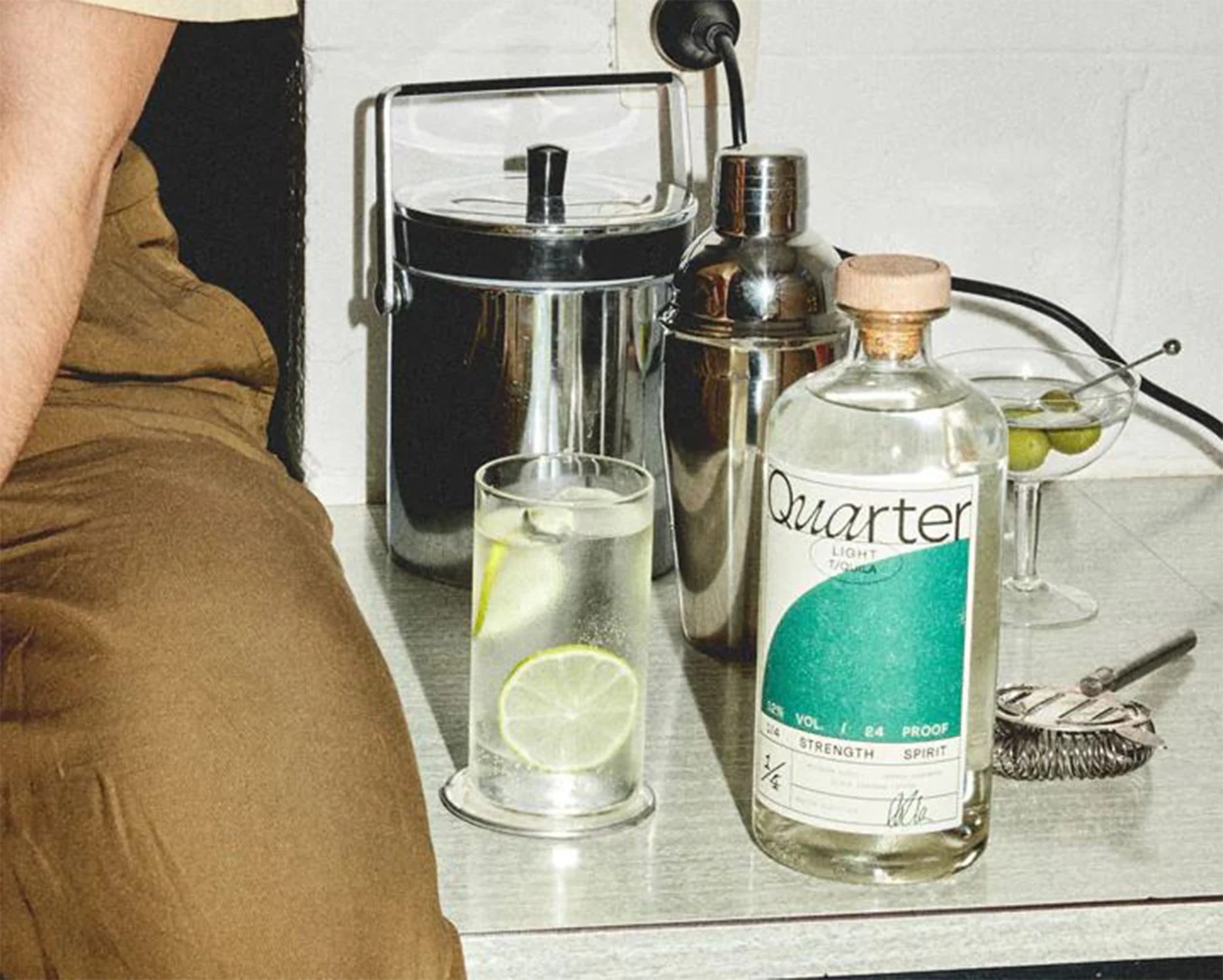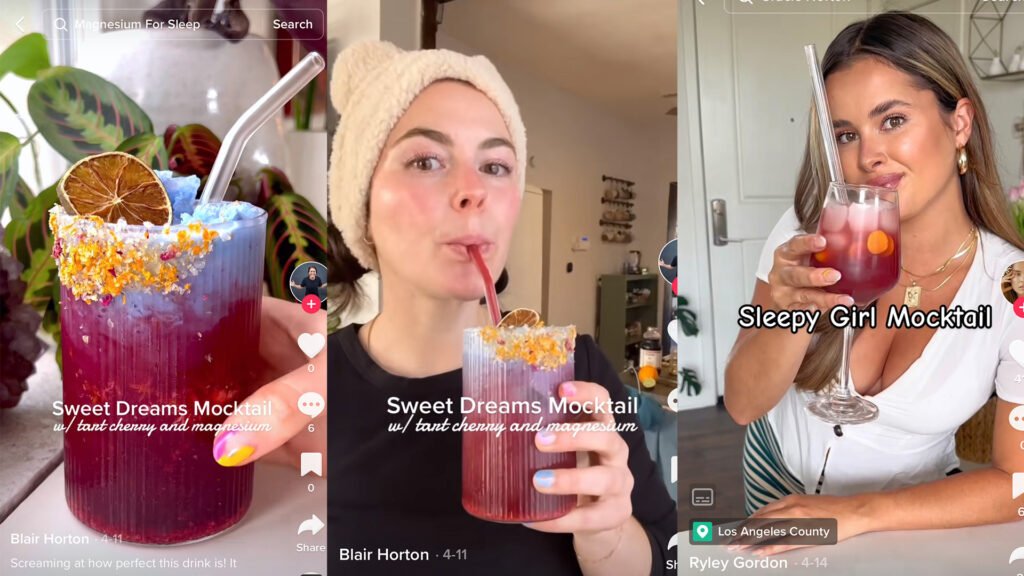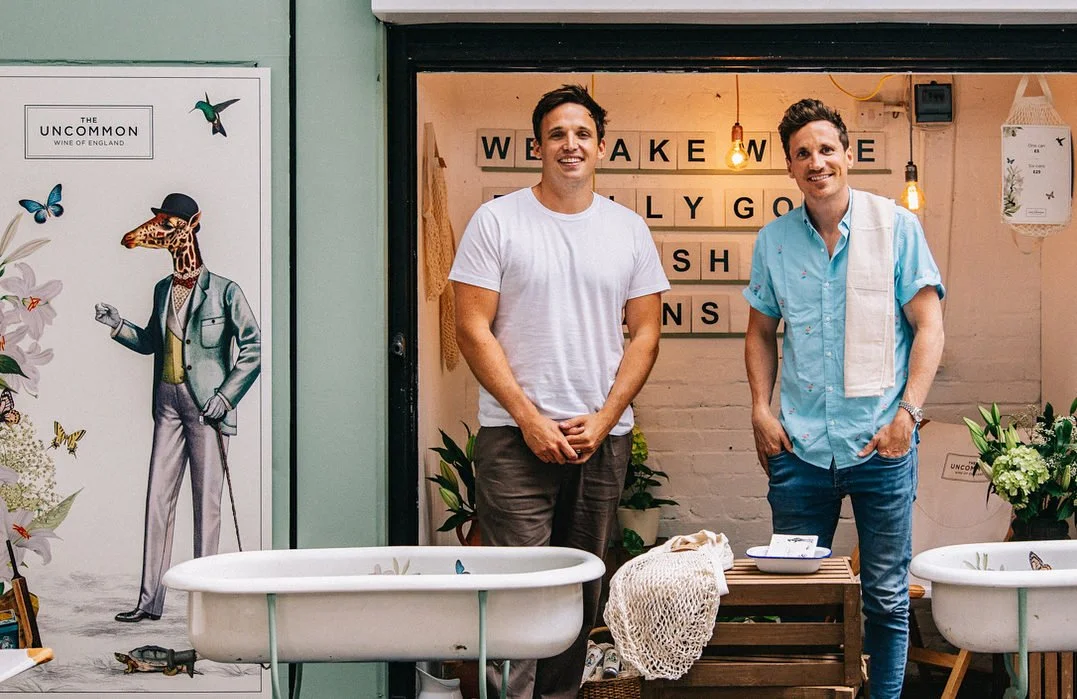Editorial ✖ Reshaping Dry Jan
How the rise of non- and low-alcoholic alternatives have helped to reframe and destigmatise Dry January and UK drinking culture.
Written by Ruby Carter, Cultural Strategist at Truant
January has always been a period of resolutions. Working out, going vegan, starting a new hobby, finally getting rid of the Lost Mary grip. The month, depressing enough with grim weather and grey skies, has always been a practice of restriction.
It’s a month centred around self-optimisation - a relentless pursuit of self-improvement in the purest, strictest sense of the word. With the blinding hangovers from New Years Eve and the excess of the Holiday season a distant memory, January was always about having a good, hard look in the mirror and promising to curb bad habits. It’s a month of wanting to ‘be better’. It’s for offsetting the periods of indulgence from the Holiday season to what we view as the opposite - completely reconfiguring our lives to be solely ‘positive behaviours’ without truly understanding how these things make us feel better.
Yes, working out is good for you, eating less meat is good for you, deleting dating apps is probably for the best, but they’re good for you in a one-dimensional way. We aren’t taking the time to understand why we’re adopting these habits in relation to self, but instead as a strict way to self-optimise and be ‘better’.
Alcohol, perhaps most of all, becomes a perennial focal point in January. It’s bad for your liver, it causes the dreaded hangovers (or even worse, hangxiety), it can worsen one’s mental health, it’s expensive, it makes you gain weight - there’s a million (both moral and physical) critiques of not only alcohol, but the drinking culture in general in the UK. Dry January, a concept that emerged nearly 12 years ago, has become a cornerstone and a ritual of self-improvement, a form of self-care, whose rigid nature sometimes veers into self-optimisation. The culture around drinking, especially the UK, is often viewed as being expensive, unhealthy, and excessive. Thus, the stereotypical image around Dry January involves declining pub invites or social events, instead opting for a night of doom-scrolling on your couch. In this way, the act of doing something to ‘be better’ actually runs the risk of isolation and loneliness (a MASSIVE problem), instead of attempting true mindfulness and self-optimisation.
Quarter: UK-based botanical-infused 'T/quila' brand
However, Gen-Z and Millennials have been steadily reframing their attitudes towards drinking. Instead of viewing alcohol as a bingeing-and-purging, black-and-white approach to consumption (you’re either sober or you’re drunk), there’s been a shift to mindfulness and moderation. According to a Disqo survey, 45% of respondents plan to explore Dry or "Damp" January. The survey also highlights an increased excitement about trying new non-alcoholic products, signalling a shift in consumer preferences. The growing sober-curious interest, particularly among Gen-Z, is driving beverage brands to compete in the space, becoming beverages of choice for those looking for 0% or low ABV. Additional research by Heineken 0.0 indicates that Gen-Z’s alcohol consumption has dropped nearly 25% over the last four years - showing that it’s seemingly not as important or culturally relevant anymore.
More interestingly, a lot of Gen-Z drinkers aren't going completely sober, but they’re picking and choosing their moments while drinking. Rather than completely restricting, a lot opt for moderated consumption throughout the year, which in turn lessens the need for a completely restricted ‘Dry Jan’. So instead of completely abstaining, they are choosing a more mindful approach to drinking, questioning the one-dimensional nature of extreme restrictions, meaning they are less likely to binge-drink, or view alcohol as the sole way to socialise with friends.
Whereas wellbeing and ‘going out’ used to be mutually exclusive, now it’s a blended event. Having high-quality alcohol alternatives beyond a lime and soda, such as Pentire or Three Spirit, or the rise of single-serving canned wine, like The Uncommon, and lower ABV options like Quarter, help make drinking feel less all-consuming, or even all that important. It puts socialisation at the forefront, helping us avoid the January blues by finding times to connect with people outside the home or work environment, without the pressure of drinking.
Pentire: Botanical non-alcoholic spirit brand
Socialising used to be restricted to the pub, whereas now more mindful approaches lead people to join community groups, sports teams, classes for hobbies. Even more so, the pub in the UK has changed from a place to purely just drink, to it being more socially acceptable to come and have a Lucky Saint, or just have one and nurse it while chatting with friends. Now, studies have shown that 77% of younger generations believe non-alc drinks won't stop them having a good time, and 48% of Gen-Z alc drinkers would consider replacing a beer with a non-alc alternative. They’ve de-centered alcohol as a pillar of fun, starting with financial instability (it’s not sustainable getting pissed every week during a cost of living crisis), but it’s also become a part of an approach to treating oneself well. It’s a desire for health and wellbeing, without restriction or FOMO.
Importantly, Gen-Z have never been into restrictions, instead heralding a blended, more mindful approach to being healthy whilst also treating themselves with love and care. They’ve foregone fad diets for mindful eating, and are now exchanging restrictive drinking (with the ideals of bingeing on Feb 1st) for mindful consumption, whatever level that may mean. They’ve recognised that excessively restrictive behaviours aren't pathways to self-improvement but rather exercises in punishment.
Three Spirit: Award-winning non-alc Elixirs & Vines
The rise of alcohol alternatives like Olipop, Poppi, TRIP, and Kin Euphorics, along with canned single serve alcoholic beverages like The Uncommon or MOTH, exemplifies a shift toward moderation and mindfulness. They can still socialise but it’s taken the taboo away from drinking to get drunk as a socially-bonding event. As Dash Lilley, co-founder of Three Spirit tells us, "We definitely wanted to be rooted in traditional drinking ‘occasions’. On the one hand, we're completely weird and hard to categorise because we're not a non-alcoholic gin or vodka but we've tried hard to show that you can use our products in familiar moments when you normally would turn to alcohol to be perked up or stimulated... or something that's going to close out the night." The growth of these non-alcoholic options help benefit social occasions, without forcing consumers to rely on drinking and alcohol out of habit or necessity.
Non-alcoholic alternatives, once restricted to a watered down lemonade or diet cola at the pub, have grown massively in quality, flavour, and accessibility. Brands like Lucky Saint have become synonymous with great taste, becoming a drink in its own right as opposed to just an alternative. As Edward Grieg-Gran, co-founder of the botanical non-alcoholic spirit brand Pentire, tells us, “We wouldn’t call ourselves an alternative, that implies your second choice…it’s really difficult to get that out of your head when you’re drinking non-alcoholic alternatives that try to mimic their alcoholic counterpart.” Edward elaborates saying, “You’d be drinking a Pentire because it tastes delicious, and makes you feel great.”
TikTok's Sleepy Girl Mocktail
It’s not only their accessibility that makes them attractive to sober curious consumers, but their massively developed tastes and flavour profiles. Gone are the days of associated low- or no-alcohol beverages as watered down replacements, instead deep levels of care are imbued to create diverse, distinct flavours, that don’t just replicate the flavours of alcohol, they’re unique to each brand with completely ownable profiles. Having a no- or low-alcohol option is no longer viewed as a “sacrifice,” for both experience and taste, but has been considered by brands as a unique task in curating enjoyable experiences for their audiences. As OPB reports, the large uptick in audiences keen for low- or no-alcohol experiences has encouraged brands to curate products to their liking, experimenting with yeast extract levels and bold, unique flavours to create something entirely different and their own… and something that doesn’t taste like watered down booze.
Even non-alcoholic cocktails are having a moment. With millions of non-alc cocktail recipes being searched and 70.1k views on #sobercurious across TikTok, non-alc cocktails have gone from a humble lime & soda to creative, bountiful concoctions, combining a diverse array of ingredients to create delicious beverages that don’t mirror cocktails, but instead stand on their own right. Some even have specific benefits - with the recent “sleepy girl mocktail” taking the online world by storm and accumulating millions of views.
It’s not just non-alcohol options that have hypnotised Gen-Z and Millennials. The importance of having “in-between-drinks” is paramount, indicative of a desire to moderate one’s intake. As Rohan Radhakrishnan, co-founder of Quarter noted, “We do not believe that it is healthy or sustainable to go through long periods of overconsumption (Christmas) to a long period of abstinence (Dry Jan). Rather, we wish to promote a form of moderation that is sustainable and achievable.” The rise of no- and low-alc beverages can help enhance social experiences for those who want to drink less and better, providing a mindful balance for those who want to drink, but want thoughtful consumption. He continues, “The gap between 0% - 40%+ ABV is huge, and we now know that experience and flavour can be created and enjoyed in the middle.”
The Uncommon: Canned sparkling wine
Additionally, the boom of canned cocktails and wines also indicates a shift to more moderated consumption - a chance to indulge without feeling the need to commit to large bottles. It shows a new thoughtfulness for Gen-Z as a consumer - a generation who are not only budget-conscious, but typically out and about with friends outside of pubs and clubs. Florence Papougnot, Head of PR & Partnerships, at the canned sparkling wine brand The Uncommon suggested, “There’s a shift towards single-serving canned beverages as it really helps people control and keep track of what they’re drinking.”
She added, “There’s more open mindedness - People don’t want to stop socialising, they just want to lower their intake.” The Uncommon is just one example of the boom in canned, lighter beverages. She tells us that The Uncommon was a way to break new ground in the world of wine, without compromising on quality. They created these spritzers to cater to occasions where a lighter option is preferred over full-strength wine - perhaps at a picnic, or at gigs and festivals, where the alternative is normally only cans of beer.
Other brands, both alcoholic and not, have begun to understand the appeal of canned cocktails. As the joint ‘cannifesto’ effort from prominent players MOTH, Longbottom & Co, The Uncommon, TRIP and Jukes Cordialities details, not only are canned beverages more environmentally conscious (they have a carbon footprint that’s 79% lower than glass), they’re more suited to certain lifestyle choices, including a desire for more moderate levels of consumption.
Canned drinks brands launch a ‘Canifesto’ feat. TRIP, MOTH, Jukes, Longbottom & Co and The Uncommon
Overall, it’s clear that brands are beginning to understand Gen-Z and Millennials attitudinal changes towards drinking. An increased importance on wellbeing, mental health, and a desire for quality over quantity needs to be reflected in their beverages of choice. Whether that’s being able to enjoy high-quality, 0% beverages while seeing friends, prioritising non-alcoholic cocktails and 0% beverages as drinks in their own rights, rather than simply viewing it as an ‘alternative.’
Read more like this
About Truant
Truant is a new era creative company, bringing maximum attention to brands through advertising and music.
Fully independent and Campaign Magazine Top 50 agency, with a unique approach that puts music at the heart of much of its work. Truant has worked with some of the world’s most iconic brands, including Pepsi MAX, Royal Caribbean, and Virgin and has twice won Campaign’s Best Places to Work.






































